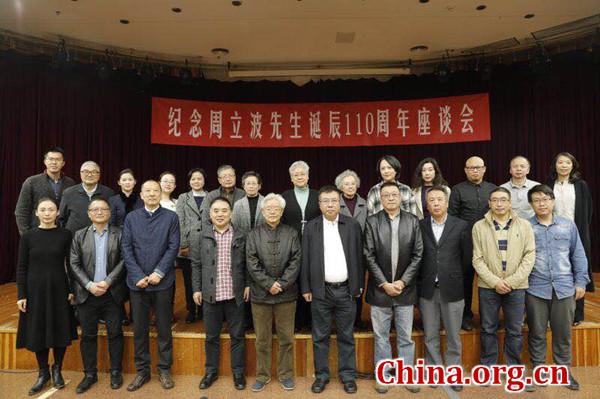Chinese novelist Zhou Libo remembered
- By Zhang Rui
 0 Comment(s)
0 Comment(s) Print
Print E-mail China.org.cn, November 4, 2018
E-mail China.org.cn, November 4, 2018

A symposium to commemorate the 110th birth anniversary of the famous Chinese novelist and translator Zhou Libo was held in Beijing on Tuesday.
Participants, including Zhou's granddaughter Amanda Zhou Lee, who lives in the United States, and grandson Zhou Muzhi, chairman of the Cloud River Urban Research Institute and professor of economics at Tokyo's Keizai University, agreed that there was still much to explore in his legacy since he died in 1979.
Zhou was born in Yiyang, Hunan province in August 1908. He began writing in 1928, and joined the League of Left-Wing Writers as well as the Communist Party of China in 1934. Zhou taught himself English to become able to translate into Chinese some English versions of Soviet novels.
From 1935 to 1937, he independently translated 17 foreign works, including Mikhail Sholokhov's "Virgin Soil Upturned."
He served as a war reporter between 1937 and 1938 during the Chinese People's War of Resistance Against Japanese Aggression (1931-1945) and also acted as an interpreter for Agnes Smedley, a well-known American journalist, writer and social activist .
He then went to Yan'an and worked at the Lu Xun Art Institute in 1939. After the People's Republic of China was founded in 1949, he created many novels and essays on the new look of China's vast rural areas, which established new themes and new styles in Chinese rural literature.
His "Rainstorms" (1948) and "Great Changes in the Hills and Countryside" (1958) were widely recognized as literature classics and excerpts from them were selected for inclusion in Chinese textbooks for elementary and high school students.
His son, Zhou Jianming, also a famous writer, observed: "It is an indisputable fact that rural literature continues to develop in the world. Its nationality and endemicity are becoming more and more prominent. I can assert that the rural literature standing in the forefront of times, with local characteristics, and reflecting the true history and exquisite arts, will remain in the literary world forever and hold a lofty position in the history of literature."
Amanda Zhou Lee has authored two books, "Stories Are Blowing in the Wind: My Grandfather Zhou Libo" and "Dreaming the Homeland and Quietly Listening to the Flute" in commemoration of her grandfather, exploring Zhou's experiences in his revolutionary journey, writing process and personal life.
"I made the decision to write about my grandfather not just because he was my grandfather," she said, but "because, for a short period, I lived with him, and we made a similar journey in our hearts…We had the same poetic sense and passion, as well as the same confusions.
"And, we both wanted to go forward peremptorily no matter what […] not fearing failure. I identified with him, and he and his works are still attractive for many people, even though he passed away many years ago. So, I chose to write about him."
Liang Guangyu, the editor of the two books and president of Unity Press, believed they would help readers fully understand Zhou Libo's yearning and choice for the revolution when young, and how a talented young man's devotion to the revolution reflected his ideals.
He said Zhou Libo was more than "an excellent writer," and called on people to carry forward and inherit the spiritual wealth from the man.
Pan Kaixiong, vice president of China Publishing Corporation Group, said: "We commemorate such a good writer Zhou Libo, from whom we can feel the vicissitudes of China's modern history, and feel that, in the context of the great era, countless young intellectuals like Zhou Libo answered to the call of the times, and merged their personal life into the destiny of their homeland.
"They are commemorated as we revisit history and do not forget history. In the historical context, this generation of writers and their works should be viewed scientifically, rationally and dialectically."
Pan added that in Zhou's works he could truly feel the strong atmosphere of the times while the sublime and poetic aesthetic features pursued by the writer revealed a sublime ideal faith.
Zang Yongqing, president of the People's Literature Publishing House, announced that in order to commemorate the 110th anniversary, his company planned not only to re-publish "Rainstorms" and "Great Changes in the Hills and Countryside," but also have "Rainstorms" included into the recommendation book list compiled by China's Ministry of Education in order to guide more students to read the classics.






Go to Forum >>0 Comment(s)